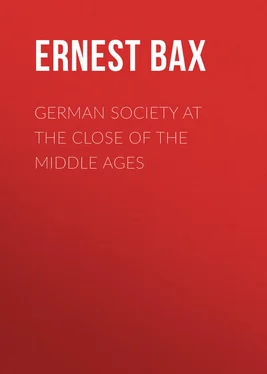Ernest Bax - German Society at the Close of the Middle Ages
Здесь есть возможность читать онлайн «Ernest Bax - German Society at the Close of the Middle Ages» — ознакомительный отрывок электронной книги совершенно бесплатно, а после прочтения отрывка купить полную версию. В некоторых случаях можно слушать аудио, скачать через торрент в формате fb2 и присутствует краткое содержание. Жанр: foreign_antique, foreign_prose, на английском языке. Описание произведения, (предисловие) а так же отзывы посетителей доступны на портале библиотеки ЛибКат.
- Название:German Society at the Close of the Middle Ages
- Автор:
- Жанр:
- Год:неизвестен
- ISBN:нет данных
- Рейтинг книги:5 / 5. Голосов: 1
-
Избранное:Добавить в избранное
- Отзывы:
-
Ваша оценка:
- 100
- 1
- 2
- 3
- 4
- 5
German Society at the Close of the Middle Ages: краткое содержание, описание и аннотация
Предлагаем к чтению аннотацию, описание, краткое содержание или предисловие (зависит от того, что написал сам автор книги «German Society at the Close of the Middle Ages»). Если вы не нашли необходимую информацию о книге — напишите в комментариях, мы постараемся отыскать её.
German Society at the Close of the Middle Ages — читать онлайн ознакомительный отрывок
Ниже представлен текст книги, разбитый по страницам. Система сохранения места последней прочитанной страницы, позволяет с удобством читать онлайн бесплатно книгу «German Society at the Close of the Middle Ages», без необходимости каждый раз заново искать на чём Вы остановились. Поставьте закладку, и сможете в любой момент перейти на страницу, на которой закончили чтение.
Интервал:
Закладка:
The opposition of the non-privileged citizens, usually led by the wealthier guildsmen not belonging to the aristocratic class, operated through the guilds and through the open assembly of the citizens. It had already frequently succeeded in establishing a representation of the general body of the guildsmen in a so-called Great Council ( Grosser Rath ), and in addition, as already said, in ousting the "honorables" from some of the public functions. Altogether the patrician party, though still powerful enough, was at the opening of the sixteenth century already on the decline, the wealthy and unprivileged opposition beginning in its turn to constitute itself into a quasi-aristocratic body as against the mass of the poorer citizens and those outside the pale of municipal rights. The latter class was now becoming an important and turbulent factor in the life of the larger cities. The craft-guilds, consisting of the body of non-patrician citizens, were naturally in general dominated by their most wealthy section.
We may here observe that the development of the mediæval township from its earliest beginnings up to the period of its decay in the sixteenth century was almost uniformly as follows: 1 1 We are here, of course, dealing more especially with Germany; but substantially the same course was followed in the development of municipalities in other parts of Europe.
At first the township, or rather what later became the township, was represented entirely by the group of gentes or group-families originally settled within the mark or district on which the town subsequently stood. These constituted the original aristocracy from which the tradition of the Ehrbarkeit dated. In those towns founded by the Romans, such as Trier, Aachen, and others, the case was of course a little different. There the origin of the Ehrbarkeit may possibly be sought for in the leading families of the Roman provincials who were in occupation of the town at the coming of the barbarians in the fifth century. Round this nucleus there gradually accreted from the earliest period of the Middle Ages the freed men of the surrounding districts, fugitive serfs, and others who sought that protection and means of livelihood in a community under the immediate domination of a powerful lord, which they could not otherwise obtain when their native village-community had perchance been raided by some marauding noble and his retainers. Circumstances, amongst others the fact that the community to which they attached themselves had already adopted commerce and thus become a guild of merchants, led to the differentiation of industrial functions amongst the new-comers, and thus to the establishment of craft-guilds.
Another origin of the townsfolk, which must not be overlooked, is to be found in the attendants on the palace-fortress of some great over-lord. In the early Middle Ages all such magnates kept up an extensive establishment, the greater ecclesiastical lords no less than the secular often having several palaces. In Germany this origin of the township was furthered by Charles the Great, who established schools and other civil institutions, with a magistrate at their head, round many of the palaces that he founded. "A new epoch," says Von Maurer, "begins with the villa-foundations of Charles the Great and his ordinances respecting them, for that his celebrated capitularies in this connection were intended for his newly established villas is self-evident. In that proceeding he obviously had the Roman villa in his mind, and on the model of this he rather further developed the previously existing court and villa constitution than completely reorganised it. Hence one finds even in his new creations the old foundation again, albeit on a far more extended plan, the economical side of such villa-colonies being especially more completely and effectively ordered." 2 2 Einleitung , pp. 255, 256.
The expression "Palatine," as applied to certain districts, bears testimony to the fact here referred to. As above said, the development of the township was everywhere on the same lines. The aim of the civic community was always to remove as far as possible the power which controlled them. Their worst condition was when they were immediately overshadowed by a territorial magnate. When their immediate lord was a prince, the area of whose feudal jurisdiction was more extensive, his rule was less oppressively felt, and their condition was therefore considerably improved. It was only, however, when cities were "free of the Empire" ( Reichsfrei ) that they attained the ideal of mediæval civic freedom.
It follows naturally from the conditions described that there was, in the first place, a conflict between the primitive inhabitants as embodied in their corporate society and the territorial lord, whoever he might be. No sooner had the township acquired a charter of freedom or certain immunities than a new antagonism showed itself between the ancient corporation of the city and the trade-guilds, these representing the later accretions. The territorial lord (if any) now sided, usually though not always, with the patrician party. But the guilds, nevertheless, succeeded in ultimately wresting many of the leading public offices from the exclusive possession of the patrician families. Meanwhile the leading men of the guilds had become hommes arrivés . They had acquired wealth, and influence which was in many cases hereditary in their family, and by the beginning of the sixteenth century they were confronted with the more or less veiled and more or less open opposition of the smaller guildsmen and of the newest comers into the city, the shiftless proletariat of serfs and free peasants, whom economic pressure was fast driving within the walls, but who, owing to the civic organisation having become crystallised, could no longer be absorbed into it. To this mass may be added a certain number of impoverished burghers, who, although nominally within the town organisation, were oppressed by the wealth of the magnates, plebeian and patrician.
The number of persons who, owing to the decay, or one might almost say the collapse, of the strength of the feudal system, were torn from the old moorings and left to drift about shiftless in a world utterly unprepared to deal with such an increase of what was practically vagabondage, was augmenting with every year. The vagrants in all Western European countries had never been so numerous as in the earlier part of the sixteenth century. A portion of these disinherited persons entered the service of kings and princes as mercenary soldiers, and thus became the first germ of the modern standing army. Another portion entered the begging profession, which now notably on the Continent became organised in orthodox and traditional form into guilds, each of which had its master and other officers. Yet another portion sought a more or less permanent domicile as journeymen craftsmen and unskilled labourers in the cities. This fact is noteworthy as the first indication of the proletariat in modern history. "It will be seen," says Friedrich Engels, 3 3 Der Bauernkrieg , p. 31.
"that the plebeian opposition of the then towns consisted of very mixed elements. It united the degenerate components of the old feudal and guild organisation with the as yet undeveloped and new-born proletarian element of modern bourgeois society in embryo. Impoverished guildsmen there were, who through their privileges were still connected with the existing civic order on the one side, and serving-men out of place who had not as yet become proletarians on the other. Between the two were the "companions" ( Gesellen ) for the nonce outside the official society, and in their position resembling the proletariat as much as was possible in the then state of industry and under the existing guild-privilege. But, nevertheless, almost all of them were future guild-masters by virtue of this very guild-privilege." 4 4 The three grades in the craft-guilds were those of apprentice, companion, and master. Every guildsman was supposed to pass through them.
A noteworthy feature of municipal life at this time was the difficulty and expense attendant on entry into the city organisation even for the status of a simple citizen, still more for that of a guildsman. Within a few decades this had enormously increased.
Интервал:
Закладка:
Похожие книги на «German Society at the Close of the Middle Ages»
Представляем Вашему вниманию похожие книги на «German Society at the Close of the Middle Ages» списком для выбора. Мы отобрали схожую по названию и смыслу литературу в надежде предоставить читателям больше вариантов отыскать новые, интересные, ещё непрочитанные произведения.
Обсуждение, отзывы о книге «German Society at the Close of the Middle Ages» и просто собственные мнения читателей. Оставьте ваши комментарии, напишите, что Вы думаете о произведении, его смысле или главных героях. Укажите что конкретно понравилось, а что нет, и почему Вы так считаете.










